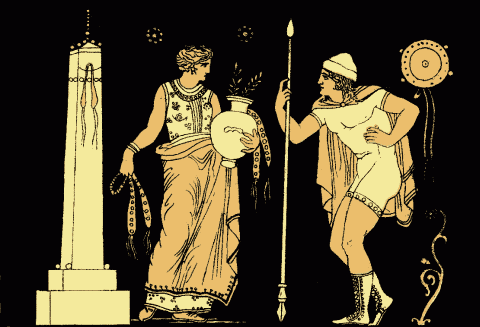Germany, split by civil strife and a complex, rumbling dispute between kings and popes over the appointment of bishops (dubbed
the Investiture Crisis), sent fewer soldiers on the First Crusade than did France or England. Yet their departure still made an impact. The annals of the monastery of Disibodenberg ... record this exodus in violent detail:
Moreover the Gospel witness confirmed it, 'And Jerusalem,' said the Lord Jesus, 'shall be trod down by the nations until the time of the nations is fulfilled' [Luke 21.24]. Whereupon not only country people but even kings, dukes and other powerful ones of the world were stirred, and I shall go on to greater things: bishops, monks and the other orders of the Church were moved to make this journey. At length when all these mentioned were agreed in purpose, kingdoms were left empty by their rulers, cities by their pastors, villages by their inhabitants. Not only men and boys, but many women also partook of this journey. Indeed females went forth on this venture dressed as men and marched in armour ...
When all who had crossed themselves to make this journey had assembled, they entered into a scheme that wherever they found Jews, they would draw them in to Christianity, either willingly or forcibly ... Many, however, were killed and their wealth seized by the Christians. The distress was so dreadful that the Jews were driven to stab and kill each other with knives. The men did not spare their wives nor their relatives; they put to death their mothers, sons and daughters.
And so, pressing on with the journey to Jerusalem, [the Christians] reached a city of Pannonia which is called Mersberg, where a great part of them were killed. And deservedly! ... In 1099 ... Jerusalem fell to the Christians. The Crusades were to remain a feature of life (if with dwindling force) for the next three centuries. Fighting was the great game of Europe and warriors were celebrated by name as the sporting icons of their day in epic verse such as the
Chanson de Roland (written down c.1100). In other crucial respects the Europe of the late eleventh century, much of it still covered in forest, bore little resemblance to the continent we know today. The idea of a nation state hardly existed until the nineteenth century. Germany itself was united neither by a particular language nor a firm geographical identity. The only common tongue was Latin, which was still the official written language for science, diplomacy, the law and, underpinning all, the Church. The continent consisted of a network of feudal loyalties and ecclesiastical sees and a mosaic of ethnic groups. A change of monarch might almost go unnoticed: at one time Germany, Italy and Burgundy were all under one ruler; Aquitaine passed between France and England without undue trouble. Leadership stemmed from a web of jostling warlords and potentates, above whom were the Holy Roman Emperor and the Pope. Then came kingdoms, corporations, duchies and archbishoprics, traces of which survive as, for example, in arbitrary boundaries of English shires.
Cultural and economic horizons were not as narrow as might be assumed. Trade was thriving. Great mercantile routes criss-crossed Europe, bringing grain, wax, honey, wood and furs from the east; silk, damask, porcelain and ivory from the south. The Rhine linked the important commercial areas ... Trade companies and guilds emerged. Methods of travel and navigation were improving: maps grew more sophisticated; the compass, borrowed from the Chinese, came into use; technical refinements to sailing eased hazardous sea voyages. Merchants risked their lives when travelling long distances over sea and land ... exchanging sturdy wool and herring for rare luxuries, spices and incense. Salt was of vital importance, first brought by the Romans from the French coast, Lorraine and the Rhineland along the ancient
Hellweg, the salt road through north and central Germany ...
Despite war, hardship and disease, Europe's population was on the increase. The climate of this period was moderate (temperatures were similar to those of the late twentieth century, though they were to drop sharply in the interim). Towns developed into conurbations, the drift from the land had begun. By the thirteenth century Mainz ... and Cologne ... were two of Europe's largest cities. Yet those people with trades—bakers, millers, goldsmiths—maintained their smallholdings and vineyards and grew much of their own food, fearful of renouncing all links with the land because of uncertainty about their urban future. The agrarian landscape, too, had changed. New crop systems and better tools led to improved harvests. Reclaimed land was used for growing cereals, pulses and root vegetables, a staple diet, supplemented by fifty kinds of fresh-water fish. Meat from livestock, mainly salted, was eaten in moderation, less frequently than game. Houses, usually made of timber, were dark, damp and cramped, with earthen floors and low, narrow doors. Homes of the gentry, to which Hildegard's family belonged, might have exotic textiles and wall hangings brought back from the Crusades, but most people relied on wool and linen of the homeliest varieties.
Fiona Maddocks,
Hildegard of Bingen (2001: 10-12)
